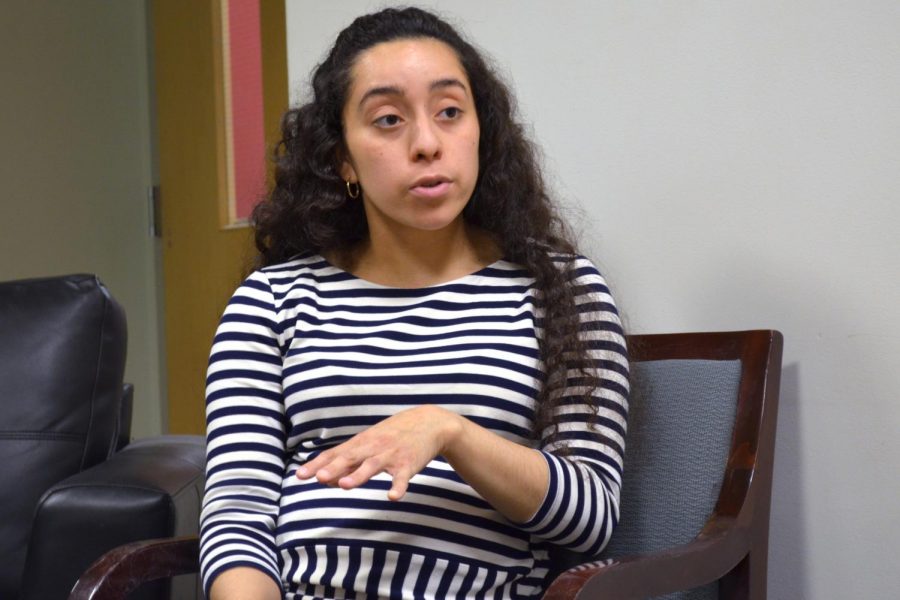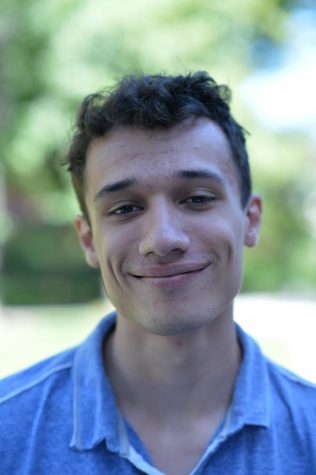WSU becomes First Forward institution
First-generation students supported by programs like Smart Start, TRIO
JENNIFER WILLIS | THE DAILY EVERGREEN
Alejandra Carranza, a senior at Washington State University, talks about her experience as a first generation student during an interview June 5 in the Lighty Student Services Building.
June 13, 2019
WSU has joined the University of Washington as the second school in Washington to affiliate with First Forward, a national program that acknowledges higher education institutions that strive to help students who are the first in their family to attend college.
To be selected as a first forward institution, university leadership had to show support and commitment to first-generation students, as well as provide information about their first-generation programs.
“The application process made us look critically on how we can improve serving first-generation students and best utilize our resources,” Angie Klimko, program director at TRIO Student Support Services, said.
TRIO is a series of eight federally funded programs designed to help students overcome socioeconomic barriers to higher education.
As one of the 80 institutions selected, WSU became a member of a nationwide group collaborating to find strategies for the success of first-generation students.
“It’s pretty phenomenal that we are leading the way in serving first-generation students,” Klimko said.
One of those first-generation students is Alejandra Carranza, a fourth-year WSU student and staff member at TRIO Student Support Services.
Carranza said she’s pleased with the effort WSU has shown to first-generation students.
“Having the university be a First Forward Institution is a big game changer because it shows they do care about us,” Carranza said.
Carranza said shewishes high schools did a better job of preparing upcoming first-generation students for college.
As a first-generation student double-majoring in architecture and civil engineering with minors in global studies, mathematics and Spanish, Carranza said college hasn’t come without its challenges.
“I’ve been on academic probation, which is a common thing for first-generation students because they don’t know how to help themselves,” she said. “I’m very lucky I was able to talk to advisers at programs the university offers.”
First-generation college students can receive assistance through the six TRIO programs: Upward Bound, Educational Talent Search, McNair, Educational Opportunity Center, Upward Bound Math-Science, Veterans Upward Bound and Training Program for Federal TRIO Programs.
Along with TRIO, Klimko said there are other programs at WSU that assist first-generation students like Smart Start, First Scholars and the College Assistance Migrant Program.
WSU was selected to become a First Forward institution through an application process reviewed by the Center for First‑Generation Student Success.
With WSU President Kirk Schulz being a member of the center’s advisory board, Klimko said that first-generation programs have full administrative support.
In two years, Klimko hopes that WSU can rise to advisory status as a First Forward institution. There are nine advisory institutions now.
Carrie Ben-Yisrael, TRIO academic coordinator and retention specialist, said WSU becoming a First Forward Institution was exactly the reason why she came to the university.
“We’re ecstatic over at TRIO. We’ve been doing this work for so long and it really does help,” Ben-Yisrael said. “WSU is putting money where its mouth is.”
There were nearly 2,000 incoming first-generation full-time freshmen in the 2017 fall semester, according to WSU’s Office of Institutional Research. Nearly 76 percent of those students graduated or were retained after one year — just under the 79 percent mark of graduation and retention for all incoming freshman that year.
The 2012 WSU first-generation freshman class has seen nearly 53 percent of those students completing their degree in six years or less. The 2015 first-generation freshman class has seen 56 percent of its students graduating in four years or less.
Data from the National Center for Education Statistics (NCES) indicated that first-generation students are also more than twice as likely to drop out. college within three years than non-first-generation students. Factors like needing more financial support and language barriers can often deter graduation.
Klimko and Ben-Yisrael said they enjoy working with first-generation students and it’s rewarding to see those students walk across the stage at graduation.
“They really have arrived,” Ben-Yisrael said. “There’s no set map for college without social capital and it’s amazing to see their resilience.”
Later this month, Klimko and another representative of her team will meet leaders from the other First Forward institutions at a mandatory workshop in Orlando, Florida on June 15.
“They can make you feel small because they have such big dreams,” Klimko said. “You learn as much from them as they learn from you.”











